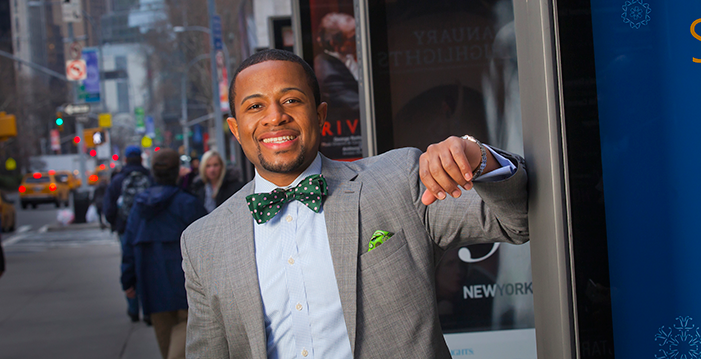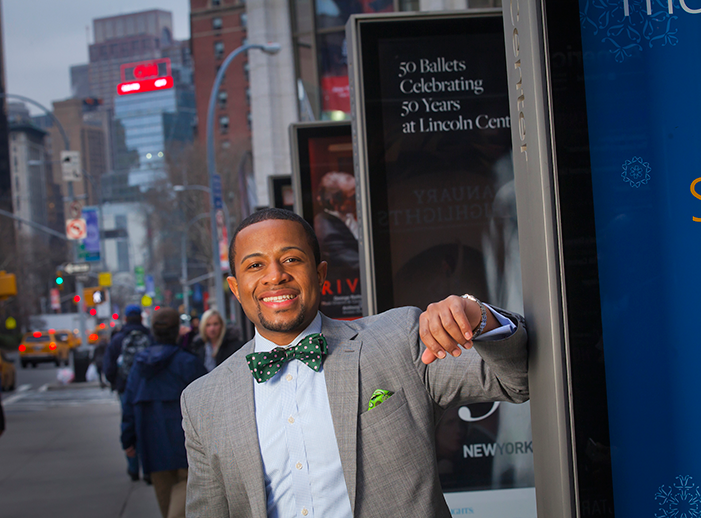Abernathy Man is a series that spotlights remarkable black men and the work they’re doing.

Photo by Chuck Zovko / Zovko Photographic llc
Harlem, the historically African-American neighborhood of Manhattan in New York, has given the world a number of influential treasures: W.E.B. Du Bois, the Harlem Renaissance, and James Baldwin, to name a few. Harlem is also home to Nkrumah Pierre, an English-born West Indian entrepreneur and CEO of PLG Consulting.
Nkrumah, known as “Kru” to his business associates, proudly flaunts tagline “Master Connector” on LinkedIn. The name was given to Nkrumah by a client who was impressed by his generous approach to networking and business development. But let’s back up a bit—Nkrumah wasn’t always the CEO of a thriving consulting firm.
In fact, the journey began in earnest during Nkrumah’s time working in commercial real estate finance. The son of a successful Brooklyn-based real estate developer, Nkrumah wanted to learn the financial side of the real estate industry. This period lasted for two years, between 2006 and 2008, until the crisis hit. As Wall Street reeled and corrected course, Nkrumah found himself suddenly unemployed, with a modest severance to cushion the blow.
It was during this time that Nkrumah set his sights on professional reinvention.
He fell into executive recruiting, at the suggestion of a friend in the industry. “I didn’t go to college to become a recruiter” Nkrumah initially responded. His friend sympathized, but insisted that Nkrumah would thrive. After a round of interviews with a few major banks that didn’t result in offers, Nkrumah relented and took a meeting with the executive recruiting firm Execu|Search. He received and accepted an offer the same week he interviewed.
The offer couldn’t have come at a better time, as the last month of his severance overlapped with his first month on the job in 2009. It was around this time that Nkrumah started noticing an uncommon level of loyalty among his clients. In three different jobs over three years in the executive recruiting industry, his clients came with him each time.
At the time, Nkrumah was sternly counseled by friends and mentors not to change jobs so frequently. “Bro, what are you doing?” was a common response. Undeterred, Nkrumah constantly felt like he was providing more value for his employers than was reflected by his income. Despite feeling undervalued, his last stint in the industry opened his eyes to the diversity and inclusion space, which is one of his fastest-growing areas of business.
Nkrumah enjoyed a decidedly straightforward transition to full-time entrepreneurship. A business trip to Guatemala with a key executive recruiting client resulted in the push he needed to launch his company. On the trip, the client encouraged Nkrumah to make the leap, and subsequently became Nkrumah’s first PLG Consulting client. One contract turned into several more once prospective clients caught wind of Nkrumah’s new business.
When asked about the timing behind launching his company, Nkrumah offered the following insight: “I understood that one, my clients consistently came with me, no matter what jersey I was wearing. Two, I was constantly connecting my clients to each other. And it’s interesting, because when you’re confident with your relationships, you open up your rolodex. Those who are not confident keep it close to the vest. The common thread was always me and my clients.”
This is perhaps the most exciting part about Nkrumah’s business presently: the market needs his services, the buyers are typically black, and Nkrumah’s product is polished. When friends inquire about Nkrumah’s latest adventure (PLG is only two years old), many of these conversations are of the “Wow, my company needs that! I’m gonna connect you with…” variety.
Watching Nkrumah do business is at once exciting and inspiring, as his firm is an extension of his personality—no less than three introductions and half a dozen event invites were offered and completed during the time between our conversation and this profile being published.
Among the feedback given by clients that’s readily apparent is his impeccable follow-through and give-first posture, asking for nothing in return. With close to a dozen mentors—many of whom sought Nkrumah out—his natural generosity has resulted in an amusing social life. “I’ve started connecting my mentors to each other. I’m starting to see my mentors with other mentors at events I didn’t even invite them to!”
In Nkrumah’s mind, fully actualized mentor-mentee relationships mean business—literally: he aims to cultivate a business component in each of them, when the time is right. “The final part of that relationships is, how do we work together? How do we, you know, do some deals?” When pressed to distill his business philosophy into a single idea, Nkrumah didn’t equivocate. “Adding value. I don’t feel like we do enough of…putting each other on, if you will.”
Further reading:
- PLG Consulting website
- Nkrumah on LinkedIn
- Nkrumah on Twitter
